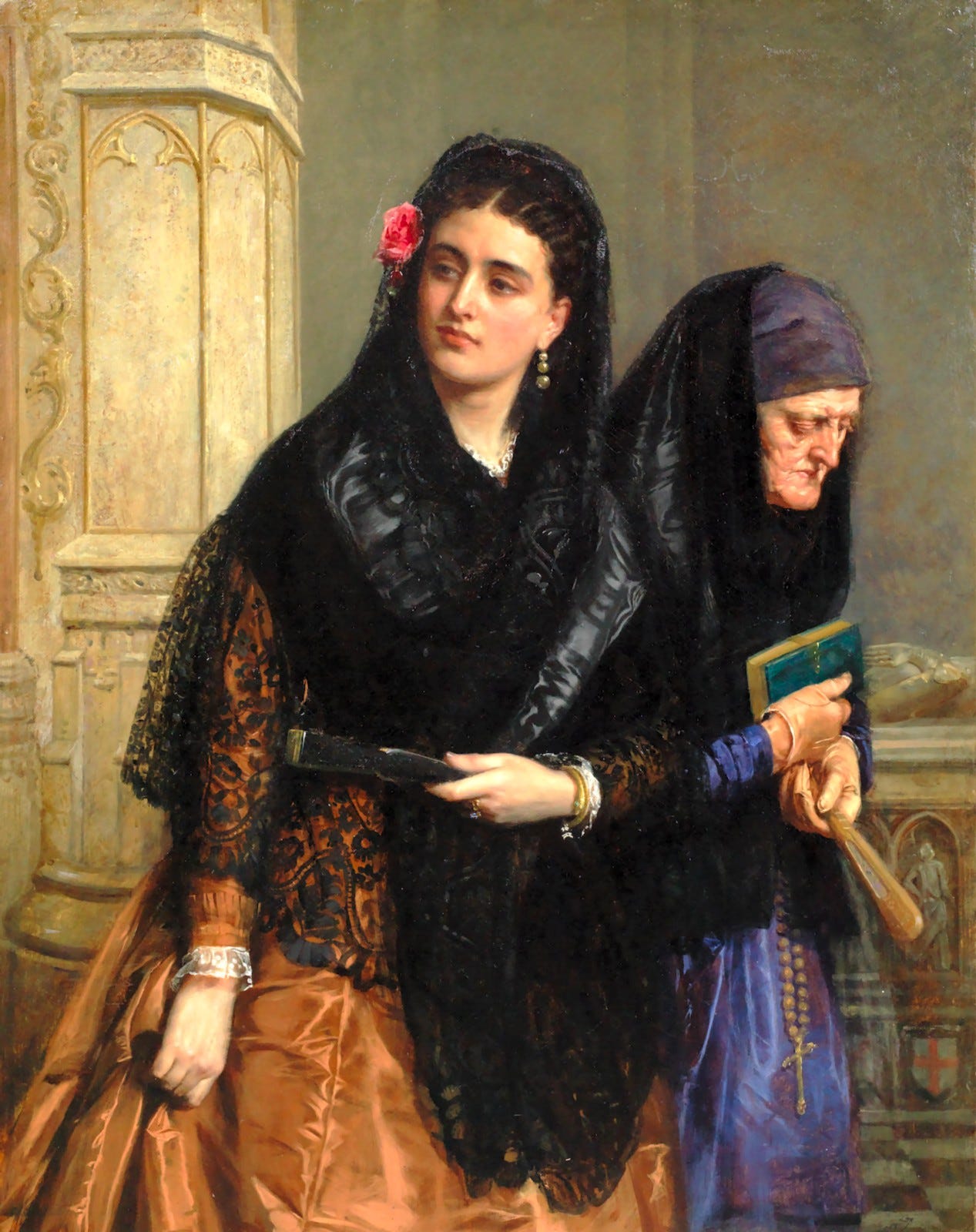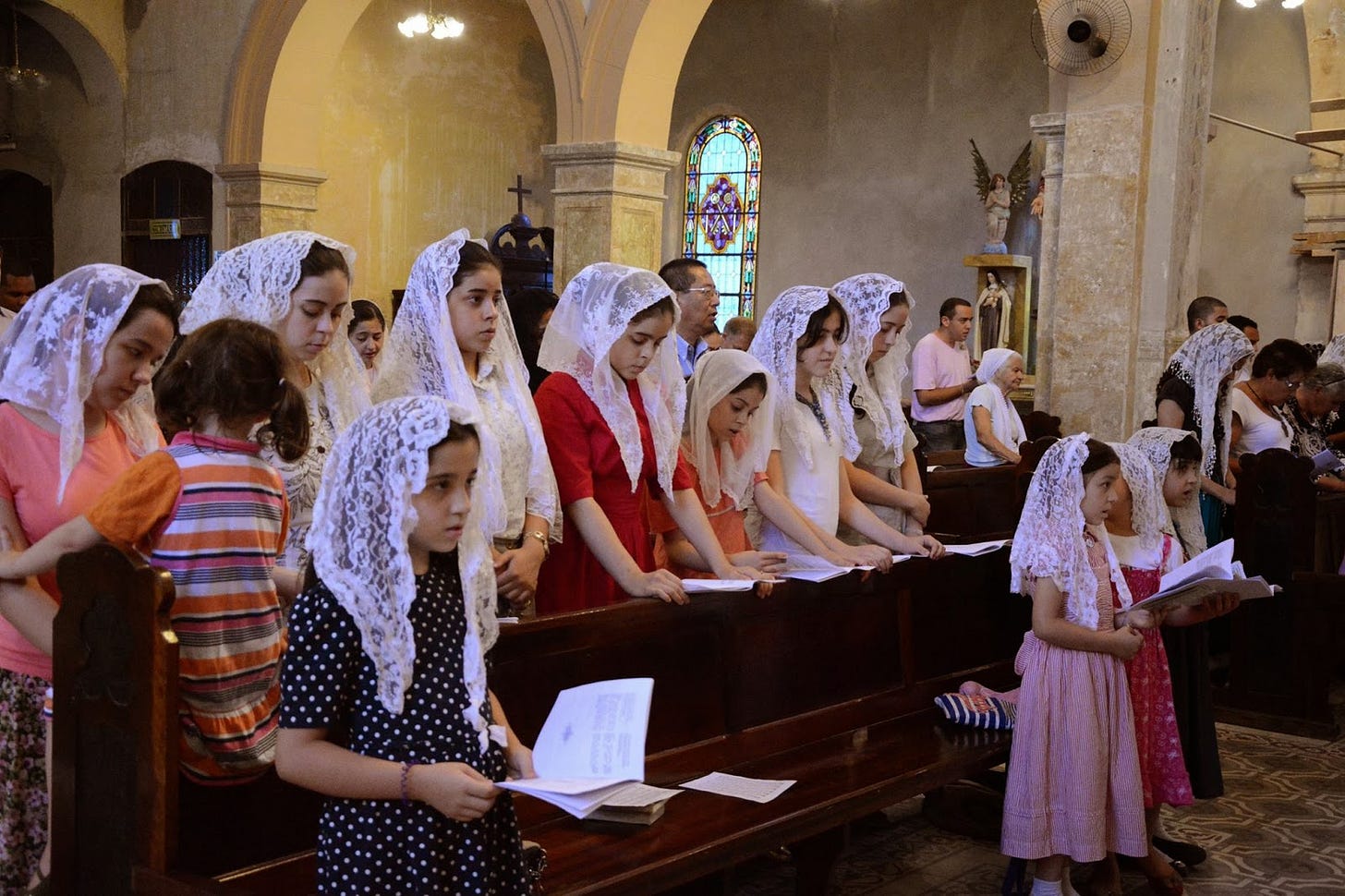Instruction on Modesty
By Fr. Daniel Pinheiro, IBP - In short, cover your knees in any position, cover your shoulders, cover everything between the two. Women wear skirts and dresses.
Note from the translator: Here is another excellent instruction by father Daniel Pinheiro, Superior of Good Shepherd Institute in Brazil. The original in portuguese can be read here.
Let your modesty be known to all men. (Fp 4, 5)
I - In relation to purity
Clothing must cover everything between the knees and shoulders, including knees and shoulders, and in any position (standing, sitting, kneeling). The garments must therefore have sleeves and must be without necklines.
Garments must not be transparent or in skin tone.
Garments must not be tight or glued to the body.
These rules apply to both men and women, but above all to women, given the greatest weakness of men in this regard. It is a precept of the Apostle Saint Paul:
[9] In like manner, women also in decent apparel: adorning themselves with modesty and sobriety, not with plaited hair, or gold, or pearls, or costly attire:
[10] But, as it becometh women professing godliness, with good works.
1 Tm, 2
Those are the minimum rules.
Even today, the entry of people with bare knees or shoulders is prohibited in the Vatican.
There is no essential difference between St. Peter's Basilica and the simplest Church: the same respect is therefore due.
Women, especially in the Church, should avoid clothes that are more convenient for men (pants). Wear skirts and dresses: this, too, is part of modesty. These rules apply everywhere, and with all the more reason, therefore, in the Church.
In short: cover your knees in any position, cover your shoulders, cover everything between the two. Women wear skirts and dresses
II – In relation to the circumstances
Clothing must be suited to what is most important on the face of the earth: the House of God, especially when the Holy Sacrifice of the Mass takes place there. The person must, therefore, dress with dignity to go to Mass, avoiding clothes that are too informal.
Dignity with simplicity and without exaggeration
In particular, clothing containing drawings or any written message, even for children, should be abolished. Also don't wear clothes with cartoon characters, with written phrases, football team shirts, ripped pants, shorts. None of this befits the sanctity and dignity of the place. But one must not fall into the opposite error. Dignity with simplicity and without exaggeration.
It is very good for women to wear a veil while in the Church, particularly during the Sacraments. St. Paul warns this in his First Epistle to the Corinthians, Chapter 11.
Duty of the Priest
It is the duty of the priest, explained in the most diverse texts of the Holy See and the Bishops, to teach modesty and exhort the faithful to it. It is also their duty not to administer the sacraments to those who do not present themselves modestly dressed to receive the graces of the Church.
The modesty
Modesty in dress is the virtue derived from temperance, which keeps the due order of reason in our external apparatus. It is to be observed chiefly in the Church, Temple of the Most High. Our clothes show who we are, our purity and the degree of importance we attach to a certain place, a certain person, a certain activity. Thus, modesty must be in accordance with purity and with the circumstances in which people find themselves.
Modesty in dress is primarily about purity. Modesty in dress avoids one's own sin — the person is not a cause of scandal for others — and at the same time avoids the sin of others. It is, therefore, charity towards oneself and towards others. To observe modesty in dress, it is necessary that the dress hides more than it shows.
Although there is some variation in relation to times and places, there is a limit beyond which a garment will always be immodest and cause harm to individuals and society. For this type of dress (swimwear, miniskirts, etc.) the law that that says what is common and habitual does not arouse passions is invalid, say the moralists. Pius XII said that “The garment must not be evaluated according to the estimation of a decadent or already corrupt society , but according to the aspirations of a society which prizes the dignity and seriousness of its public attire…” He also said that “style must never be a proximate occasion of sin” (1957 to Congress of Latin Union of High Fashion).
For this type of dress (swimwear, miniskirts, etc.) the law that says what is common and habitual does not arouse passions is invalid
This limit is set by the knees and shoulders, which must always be covered, as well as everything between the two.
Modesty is necessary not because the body is evil in itself, but precisely because of its nobility, because it is the temple of the Holy Spirit and because of the wounds of original sin. Adam and Eve covered themselves after original sin and God clothed them even more: “And the Lord God made for Adam and his wife garments of skins, and clothed them.” (Gen. III, 21).
However, such modesty does not only consist in not being a cause of sin for others, but also in dressing in accordance with one's state, circumstances, the degree of formality of the place, the activity, and taking into account the dignity of the person whom you are with.
Concrete rules are needed, especially today when the ubiquity of immodest clothing prevents common sense from discerning what is really modest or not. Abstract rules have led to the state of affairs in which we find ourselves today. As already said, custom cannot make a garment that is immodest in itself, modest. Furthermore, no one is a good judge of his own cause, particularly when it comes to modesty.
In the Act of Reparation to the Sacred Heart, written under the orders of Pope Pius XI (Acta Apostolicae Sedis, Vol. XX, N. 6 pp. 177, 184), we say:
“Not only are we anxious to expiate all these deplorable crimes, but in an especial manner do we purpose to make reparation for these following: immodesty and shameful excesses in life and dress […].”
May we recite such an act with sincerity, beginning by dressing modestly. God will reward the efforts of those who dress modestly and thus avoid their own sin and the sin of others. The examples of Our Lady, the most pure Virgin, and of Saint Joseph, her most chaste spouse, must be followed by those who love God above all things.
Fr. Daniel Pinheiro






